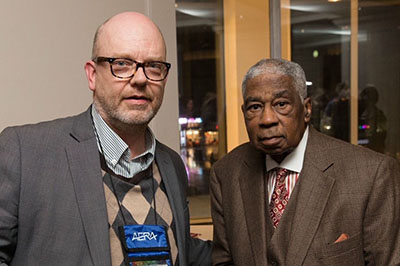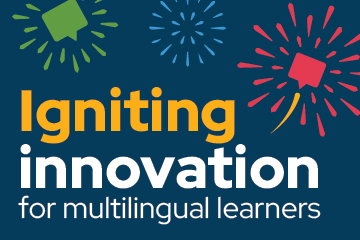Conversations with Tim: Serving underserved and undervalued students

This edition of Conversations with Tim features a discussion between Tim Boals, WIDA founder and director and Carl Grant, a professor in the UW–Madison School of Education. Throughout his more than 30 years of teaching, Carl has written about and worked with teachers and administrators to improve student achievement, knowledge and skills in multicultural social justice, culturally responsive curriculum development, and teaching.
Tim and Carl sat down (virtually) with Merideth Trahan, WIDA chief of staff, to talk about multicultural and antiracist education, and how to support underserved and undervalued students.
Note: This conversation took place in May 2021 and has been lightly edited for clarity and length.
Listening option: Listen to the audio here or continue reading this abridged version of their conversation.
Tim: We know that you've always been very inclusive in your approach to multicultural education. Tell us about your approach.
Carl: I guess if I would go back to the late 60s early 70s, we saw multicultural education as a way to bring people together. As a way to talk about the different people in this country: their histories, their culture, their participation in American democracy, and how they have contributed to a democracy and how they have contributed to living together. The whole notion of “we the people” has always been a thought in my mind as I've thought about multicultural education. And then, this idea moved on, especially when Christine Sleeter and I, and some other people, looked at how multicultural education, which became very much written about and thought about in the 70s and 80s, was being used in the schools. And there were different approaches to multicultural education that we could see and teachers and principals in schools acting on it, but our concern was always with what we call multicultural education that really spoke to democracy and was related to social justice. That is the way that I think about multicultural education because, particularly in this moment, we need multicultural education.
Tim: I remember the book that you wrote on multicultural education with Christine Sleeter, which is called “Turning on Learning.” When I read that book, it struck me that what you had in that book were lesson plans, before introducing the multicultural dimension and after introducing the multicultural dimension. The thing that struck me when I began to read those lesson plans were how much stronger the lessons were, how much deeper the thinking was and the demands on student engagement, with the addition of the multicultural perspective.
Carl: That was the purpose. My belief is that we can teach practically most concepts, most ideas, most things that we are asked to do in schools, very much from a multicultural perspective that will enrich and enhance and help the interests of the students.
Tim: The next question brings us up to today. What is anti-racist education and why is that term important given the context we're living in?
Carl: Education in this country, as it relates to people of color, has always been anti-racist. It has always said let's deal more with we the people, this union. And within that context to push back on one way of seeing things just only centering one group of people. So, anti-racist education is deliberate in its language, especially in this time, when that is such a push back and we have not as a country embraced the “we the people.” That we're all together as one. Therefore, scholars, and others, have said that we need to be more deliberate in our language to make sure of what we're speaking about. We're speaking about an education: policy, practice, ways of teaching in schools that is anti-racist, that push back on any form of racism.
Tim: Given everything that's going on right now, from the Derek Chauvin trial to the police shooting of Daunte Wright and the recent examples of Asian hate, what do you think teachers should be conveying to their students?
Carl: Honestly, trust and truthfulness are very important. Truthfulness, but also that we as a people can come together and that we need to come together. That we do not help the great ideas on which this country is founded on by pushing against one another. Within that context, it has to be anti-racist. So, teachers today, any teacher looking out at their children need to see them with proud, determined humanity and an understanding that all kids are gifted, they come that way. They can learn. There is no deficit. There should be no deficit way of thinking about children.
Tim: That reminds me of what we call the Can Do Philosophy at WIDA and the assets-based approaches to learning. We say to teachers, if you go down that road of deficit thinking towards your kids, then we've really lost.
Carl: It has to be high expectations. As I mentioned to you before, I'm working on a book by Lorraine Hansberry. She discusses to be young, gifted and black, as well as to be young and gifted. This is what we need to see in the children that are seated before us.
Tim: Speaking of your books, your book, “James Baldwin and the American Schoolhouse,” is coming out. Tell us a little bit about it.
Carl: What I did was to imagine James Baldwin coming to the School of Education, speaking to the faculty and students, and then giving a convocation at the beginning of the school year. In many ways the book is based upon two to three articles that he wrote: “A Talk to Teachers,” one that he gave to students in Oakland, California that picks up on his theme of telling teachers to go for broke, to go all out in the teaching of students.
Another thing that resonated with me as I was writing the book – these essays were written during the height of the civil rights movement – was when James Baldwin was in the South on a visit for CORE [Congress of Racial Equality] and as he was looking at the students, and these were college students, as he looked at them, he said, “These students are only a few years older than me. But they're not me. They are different.” It's like the students we see today. With each generation, students change. That doesn't mean they don't bring many of the traditions with them from the past, but they want progress – they are moving.
In the book I use the word radical, not radical in a negative sense, but radical in the sense that we have to, to use Baldwin's term, go for broke in our teaching. We have to go all out. High expectations for the students. Work at learning how to teach the students that are seated before us.
I think it is a book written for teachers and people at the university, and it speaks to bringing arts and artists into the schoolhouse. To help us with our pedagogy and the way we think about the policies that we use.
Tim: That sounds inspiring. I think given what's going on in America today, there's no better time to reread James Baldwin and think about how you might teach him in a classroom environment.
Carl: Baldwin remains relevant. He's utterly relevant in this particular moment.
Tim: You couldn't have written this book at a better time. I’m sure a lot of teachers will be excited to see it. One of the things that's always struck me about you, Carl, is your ability to remain optimistic. I'm wondering if you can share with our teachers how you remain so optimistic and hopeful in the face of everything that we've gone through.
Carl: When I taught school in Chicago – let me just say “a few years ago” – and I would look out at the students sitting before me, you can't help but feel optimistic because they are positive thinkers. They are looking ahead. They have dreams. You have to have optimism about their dreams. As a faculty member here at UW, when I see the graduate students in my classes – I just finished teaching a class on anti-racist education – the students in the class who are going out and will run our schools and teach in our universities, they are optimistic. So, you can't help but feel that way.
The other reason I feel optimistic is because when you listen to the parents and the relatives of those who have been killed in this horrible violence that we've been dealing with, all of them are optimistic. You do not hear negative thoughts. They want justice, they want accountability, but they are still very optimistic in the way they see the United States. They are optimistic for their children, for the children who were left behind, for those who were killed. So it's easy for me to feel optimistic. But as I feel optimistic, I also deal with reality.
Tim: That piece you mentioned about seeking justice is something that we have to continue to work towards in this country. As you were speaking, I recalled a time when you and I were out and I accidentally mentioned the word retirement. I recall that you looked at me with a big smile on your face and said, “Why would anybody want to retire when there is so much for both of us to do to continue working with teachers and inspiring teachers.” I was struck by your sentiments and your love for this profession.
Carl: It's not a selfish reason, but it is the work that you see laid out before you. It is wanting to be helpful. It gives an opportunity to speak to power, the way you want to speak. I do this without fear. I am not worried. You do need a few people around who will not hesitate to offer voice and to give voice when and where they think it is needed, not in any way to be hurtful. But in this moment, in this era of George Floyd, you also need people speaking out, and this is something that I've never hesitated to do.
Tim: We are so inspired by you. I just want to thank you for the work that you do at UW with students, for the books that you write that so many teachers enjoy reading, and maybe enjoy is not the right word, but they're inspired. They're inspired to move forward and do better.
About Conversations with Tim
Conversations with Tim, WIDA Founder and Director is a WIDA news article series that features a conversation between WIDA Founder and Director Tim Boals and a colleague or two in the field of multilingual learner education. Together, they discuss the important innovation, research and collaboration taking place today.




